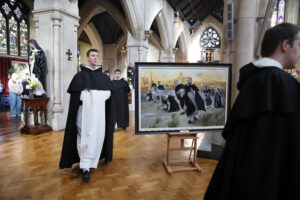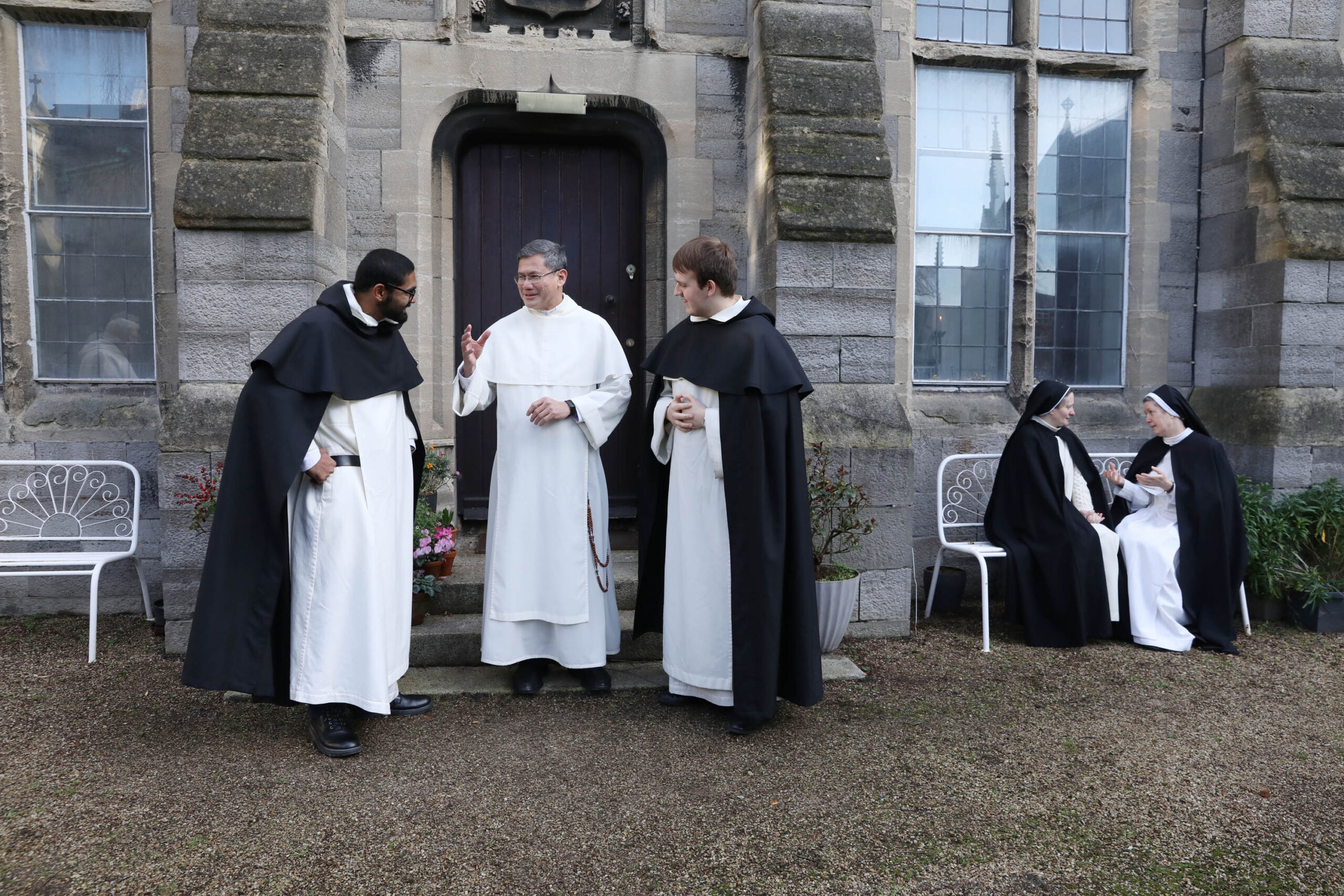On Sunday 11 February, the Feast of Our Lady of Lourdes, the Dominican Order celebrated 800 years in Ireland with Father Gerard Francisco Timoner OP as chief celebrant for a Mass in the historic and beautiful Saint Saviour’s Church on Dominic Street in the heart of Dublin city centre. Father Timoner (56), from the Philippines, was elected as Master of the Order in 2019, the first non-European to hold the office.
Along with other clergy, His Excellency, Archbishop Luis Mariano Montemayor, the Apostolic Nuncio to Ireland, and Archbishop Dermot Farrell, Archbishop of Dublin, presided at the Mass. The congregation included groups from those who attend the ten Dominican priory churches around Ireland, as well as Dominican nuns, Dominican sisters and Dominican laity at this Mass.
During his time in Ireland, Father Timoner met with twenty-one Dominican students in formation in Dublin – seventeen for the Irish province, and four for other provinces – the Dominican nuns at Siena monastery, Drogheda, and the communities at Saint Mary’s, Tallaght, and Saint Saviour’s, Dublin.
In 1224, three years after the death of Saint Dominic – the founding Master of the Order of Preachers – and not quite eight years after the foundation of the Order (December 1216), twelve members travelled from Oxford to Dublin, to set up a priory on the north bank of the Liffey, where the Four Courts now stand. Dominicans now number 125 in Ireland, of whom seventeen are young men in formation.
Besides their commitment to preaching in their churches, Dominicans in Ireland are involved in preaching retreats and missions, in education (Newbridge College, and primary schools in Dundalk and in parishes where the Order works). The Saint Martin Apostolate, home of The Moving Crib, is a Dominican undertaking as is Knockadoon Camp in Co Cork which has for decades fulfilled its mission of bringing young people to Christ in a vibrant way. Dominican Publications, publishers of magazines and books since 1897, is contributing to the centenary celebrations by launching a new bi-monthly magazine, Conversations. The Priory Institute has, since 2000, provided the opportunity to study theology, by distance learning, to degree and master’s level.
At the end of the Mass, the Master of the Order unveiled a specially commissioned painting (below) of ‘The Arrival of the Dominicans in Dublin’, by the artist William A Nathans. Photographs courtesy of John McElroy.

Caption Dominicans unveil the painting commemorating ‘The Arrival of the first Dominicans in Dublin in 1224’ by artist William Nathans
See below Father Timoner’s homily that was delivered during the Mass.
ENDS
Full Text Sermon of Father Gerard Francisco Timoner,
We have heard in the Gospel for this Sunday, that Jesus, filled with compassion, or moved with pity, cured the leper who begged him for help. It is compassion that moved Jesus to perform miracles. It is the same mercy that compelled Jesus to teach and shepherd His people: “He saw a large crowd, and He felt compassion for them because they were like sheep without a shepherd; and He began to teach them many things” (Mark 6:34). Mercy is love that feels and seeks to ease the pain and suffering of the beloved.
At the beginning of our life in the Order, we were asked one question: “what do you seek?”; we prostrated, and with our noses on the floor of the church, we responded: “God’s mercy and yours”. We are Dominicans because of God’s mercy. If our lives as Dominicans began with that primordial desire to obtain mercy, then our ministry of preaching in different forms, as Dominicans, ought to proceed from the same impetus. The ministry of the Word, the Order’s charism to preach Jesus, is in fact a sublime work of mercy, an act of charity. Pope Benedict XVI said that “the greatest act of charity is evangelization…There is no action more beneficial – and therefore more charitable – towards one’s neighbor than to break the bread of the word of God, to share with him the Good News of
the Gospel, to introduce him or her to a relationship with God”. It is no wonder then that our motto “Veritas” could also be understood as “Passion for the Truth and Compassion for Humanity”. Our Holy Father Dominic, when he was a student in Palencia, and then throughout his life as a friar, preached misericordia veritatis, the mercy of truth perfectly manifested in Christ, misericordiæ Vultus, “the face of the Father’s mercy”. Thomas Aquinas defines mercy as “heartfelt sympathy for another’s distress (affective mercy), impelling us to succor him if we can (effective mercy)”.
Today, we thank the Lord for the gift of 800 years of Dominican presence and preaching here in Ireland. Mercy and compassion moved Jesus to do miracles. Mercy and compassion prompted the friars to venture to places far and near to preach Jesus, the Light of the world, lumen gentium, to accompany people so that, with the light of Christ, they may overcome what St. Thomas Aquinas calls the twofold darkness of ignorance and sin.
Thanks to God’s unending grace, our Dominican confreres brought and continue to bring the Gospel to countless persons here in Ireland and beyond this beautiful island. It is tempting to think that your endurance and growth as a province concretely indicates how much God loves you. To a significant sense, that is true. But the number of friars and the thousands of people you serve are an indication of how God provides (providere), i.e., foresees, not your needs, but the needs of the Church and the world. You have founded the provinces of Australia and India, the former is a continent and the latter is a subcontinent. The sons of the province of Ireland went to the Caribbean and the Americas as missionaries. The province of Hibernia was suppressed, persecuted, but it never hibernated. It is the mother province of martyrs, two were officially recognized by the Church: Peter Higgins and Terence Albert O’Brien. It is the province that provided the first two bishops of New York Richard Luke Concanen and John Connolly. Your brothers have served as Masters of the Order, Michael Browne and Damian Byrne, some served as members of the General Curia, scholars, professors, pastors, retreat facilitators, and chaplains of various groups. The past 800 years are a manifestation of Divine providence, of how God provides for his people. God cares for you, God cares for his people through you!
Many years ago, I attended a gathering of religious brothers and sisters in initial formation. I proudly introduced myself as a Dominican. In jest, one participant replied: “Dominican? You are medieval!” I responded with a smile: “We are not medieval, we are classical!” A “classic” is at once timeless and timely. It is timeless not because it lies beyond the vicissitudes of history, but because it becomes an event of meaning in every moment of history. St Dominic embraced a mission that is timely, because he saw a
world in dire need of a new evangelization; yet the same mission is truly timeless, because every generation is in want of a new evangelization, i.e., the preaching of God who is ever ancient, yet ever new. “Speaking either with God or about God”, St Dominic exemplified a disciple-missionary, called tofollow and sent to preach the way of the Gospel. Indeed, St. Dominic has “something to say” to all times and places because the Gospel that formed and transformed his life is classical. Medieval yet contemporary — that is St Dominic — truly classical!
We are in the Order in response to the call of Jesus, “come follow Me”. We realized that this vocation also entails following Him who tells us: “if you love me, feed my sheep.” In imitation of the Good Shepherd, we “leave the ninety-nine to seek the one sheep who is lost”. But in our time, it seems that the reverse is happening in some parts of the world — only few remain in the sheepfold and, sometimes, it is the “ninety-nine” who have left our churches!
Thus, in our world today, we need to remember another metaphor for our vocation. Before Jesus asked Peter “to feed the sheep”(John 21:15-19), he told him “Come, follow me, and I will send you out to fish for people” (Matthew 4:19).
The vocation of “shepherds” and “fishermen” are complementary but different. A shepherd is usually entrusted with a flock, nurtures them, and accompanies them in their journey of faith. Certainly, an indication of the maturity of the flock or the members of the Church is their capacity to become “missionary-disciples”, as Pope Francis reminds us. On the other hand, a fisherman, by nature, is more audacious and ardent than a shepherd. He must go out to catch new fish every day! A shepherd cares for his flock. A good shepherd knows his sheep, and the sheep recognize his voice. New lambs are born into the flock while some die. But the size of the flock tends to be stable. On the other hand, the fisherman looks out for fish every day. The fish are in the waters, sometimes deep waters and the fisherman goes out to seek them out. Jesus chose his apostles not only to shepherd his people, but to go forth to fish for people from all nations. Perhaps, our mission today is more analogous to that of fishermen than just shepherds. Perhaps there is inertia in many parts of the world today because as one author wrote: “Too many Christians are no longer ‘fishers of men’ but keepers of the aquarium.”
As you look forward to the next centenary, it would be good to heed the words of the prophet Jeremiah “But now I will send for many fishermen,” declares the Lord, “and they will catch them” (Jer. 16:16). I hope and pray that your privilege of blessing Galway bay which marks the fishing season will give you the opportunity to learn important lessons from the fisherfolk: That while one shepherd can live in isolation apart from other shepherds, fishermen need to work together as a team to catch fish with large nets. Peter was not working alone when the Lord told him: Duc in altum, “Put out into deep water and lower your nets for a catch”. (Luke 5:4-11). That fishermen must go where the fish are. We must “go out into the world and preach the Good News!” To catch “netizens” we must go to the “digital continent”. That fishermen know that one of the rules of fishing is “not to scare the fish away”. To catch fish, we must understand that some fish must be lured with a bait, some need to be fed, some need to be netted. We must truthfully ask ourselves what are the things in the way we live and the way we preach that drive people away? And finally, that fishermen know how to be patient and wait for God’s grace to work on people. Just as a fisherman cannot force the fish to come, so we cannot force people to come. Peter and John and their companions caught nothing all night. But when they listened to the instruction of Jesus, they caught a large haul of fish! To be fishers of men, we must listen to the voice of Jesus through our prayer and contemplation. We must act promptly when he tells us to throw our nets to the other side of the boat (Luke 5:4-11, John 21:6), to be ready when God’s grace touches the hearts of people.
I hope and pray that in the coming years you will find concrete ways “to mend your nets” just as James and John were “mending their nets” when Jesus called them. “Mending the nets” of the province does not only mean repairing a part that is torn, it also means to restore, to improve, to perfect, and to adjust the nets so that you can cast them into the deep, duc in altum!


